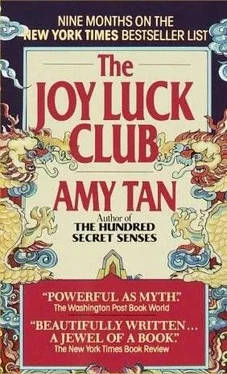As soon as she tasted it, she began to rise, then fly-not like the Queen Mother-but like a dragonfly with broken wings. "Flung from this earth by my own wantonness!" she cried just as her husband dashed back home, shouting, "Thief! Life-stealing wife!" He picked up his bow, aimed an arrow at his wife and-with the rumblings of a gong, the sky went black.
Wyah! Wyah! The sad lute music began again as the sky on the stage lightened. And there stood the poor lady against a moon as bright as the sun. Her hair was now so long it swept the floor, wiping up her tears. An eternity had passed since she last saw her husband, for this was her fate: to stay lost on the moon, forever seeking her own selfish wishes.
"For woman is yin," she cried sadly, "the darkness within, where untempered passions lie. And man is yang, bright truth lighting our minds."
At the end of her singing tale, I was crying, shaking with despair. Even though I did not understand her entire story, I understood her grief. In one small moment, we had both lost the world, and there was no way to get it back.
A gong sounded, and the Moon Lady bowed her head and looked serenely to the side. The crowd clapped vigorously. And now the same young man as before came out on the stage and announced, "Wait, everybody! The Moon Lady has consented to grant one secret wish to each person here…" The crowd stirred with excitement, people murmuring in high voices. "For a small monetary donation…" continued the young man. And the crowd laughed and groaned, then began to disperse. The young man shouted, "A once-a-year opportunity!" But nobody was listening to him, except my shadow and me in the bushes.
"I have a wish! I have one!" I shouted as I ran forward in my bare feet. But the young man paid no attention to me and walked off the stage. I kept running toward the moon to tell the Moon Lady what I wanted, because now I knew what my wish was. I darted fast as a lizard behind the stage, to the other side of the moon.
I saw her, standing still for just a moment. She was beautiful, ablaze with the light from a dozen kerosene lamps. And then she shook her long shadowy tresses and began to walk down the steps.
"I have a wish," I said in a whisper, and still she did not hear me. So I walked closer yet, until I could see the face of the Moon Lady: shrunken cheeks, a broad oily nose, large glaring teeth, and red-stained eyes. A face so tired that she wearily pulled off her hair, her long gown fell from her shoulders. And as the secret wish fell from my lips, the Moon Lady looked at me and became a man.
For many years, I could not remember what I wanted that night from the Moon Lady, or how it was that I was found again by my family. Both of these things seemed an illusion to me, a wish granted that could not be trusted. And so even though I was found-later that night after Amah, Baba, Uncle, and the others shouted for me along the waterway-I never believed my family found the same girl.
And then, over the years, I forgot the rest of what happened that day: the pitiful story the Moon Lady sang, the pavilion boat, the bird with the ring on its neck, the tiny flowers blooming on my sleeve, the burning of the Five Evils.
But now that I am old, moving every year closer to the end of my life, I also feel closer to the beginning. And I remember everything that happened that day because it has happened many times in my life. The same innocence, trust, and restlessness, the wonder, fear, and loneliness. How I lost myself.
I remember all these things. And tonight, on the fifteenth day of the eighth moon, I also remember what I asked the Moon Lady so long ago. I wished to be found.
The Twenty-Six Malignant Gates
"Do not ride your bicycle around the corner," the mother had told the daughter when she was seven.
"Why not!" protested the girl.
"Because then I cannot see you and you will fall down and cry and I will not hear you."
"How do you know I'll fall?" whined the girl.
"It is in a book , The Twenty-Six Malignant Gates, all the bad things that can happen to you outside the protection of this house."
"I don't believe you. Let me see the book."
"It is written in Chinese. You cannot understand it. That is why you must listen to me."
"What are they, then?" the girl demanded. "Tell me the twenty-six bad things."
But the mother sat knitting in silence.
"What twenty-six!" shouted the girl.
The mother still did not answer her.
"You can't tell me because you don't know! You don't know anything!" And the girl ran outside, jumped on her bicycle, and in her hurry to get away, she fell before she even reached the corner.
Waverly Jong
I was six when my mother taught me the art of invisible strength. It was a strategy for winning arguments, respect from others, and eventually, though neither of us knew it at the time, chess games.
"Bite back your tongue," scolded my mother when I cried loudly, yanking her hand toward the store that sold bags of salted plums. At home, she said, "Wise guy, he not go against wind. In Chinese we say, Come from South, blow with wind-poom!-North will follow. Strongest wind cannot be seen."
The next week I bit back my tongue as we entered the store with the forbidden candies. When my mother finished her shopping, she quietly plucked a small bag of plums from the rack and put it on the counter with the rest of the items.
My mother imparted her daily truths so she could help my older brothers and me rise above our circumstances. We lived in San Francisco 's Chinatown. Like most of the other Chinese children who played in the back alleys of restaurants and curio shops, I didn't think we were poor. My bowl was always full, three five-course meals every day, beginning with a soup full of mysterious things I didn't want to know the names of.
We lived on Waverly Place, in a warm, clean, two-bedroom flat that sat above a small Chinese bakery specializing in steamed pastries and dim sum. In the early morning, when the alley was still quiet, I could smell fragrant red beans as they were cooked down to a pasty sweetness. By daybreak, our flat was heavy with the odor of fried sesame balls and sweet curried chicken crescents. From my bed, I would listen as my father got ready for work, then locked the door behind him, one-two-three clicks.
At the end of our two-block alley was a small sandlot playground with swings and slides well-shined down the middle with use. The play area was bordered by wood-slat benches where old-country people sat cracking roasted watermelon seeds with their golden teeth and scattering the husks to an impatient gathering of gurgling pigeons. The best playground, however, was the dark alley itself. It was crammed with daily mysteries and adventures. My brothers and I would peer into the medicinal herb shop, watching old Li dole out onto a stiff sheet of white paper the right amount of insect shells, saffron-colored seeds, and pungent leaves for his ailing customers. It was said that he once cured a woman dying of an ancestral curse that had eluded the best of American doctors. Next to the pharmacy was a printer who specialized in gold-embossed wedding invitations and festive red banners.
Farther down the street was Ping Yuen Fish Market. The front window displayed a tank crowded with doomed fish and turtles struggling to gain footing on the slimy green-tiled sides. A hand-written sign informed tourists, "Within this store, is all for food, not for pet." Inside, the butchers with their blood-stained white smocks deftly gutted the fish while customers cried out their orders and shouted, "Give me your freshest," On less crowded market days, we would inspect the crates of live frogs and crabs which we were warned not to poke, boxes of dried cuttlefish, and row upon row of iced prawns, squid, and slippery fish. The sanddabs made me shiver each time; their eyes lay on one flattened side and reminded me of my mother's story of a careless girl who ran into a crowded street and was crushed by a cab. "Was smash flat," reported my mother.
Читать дальше












